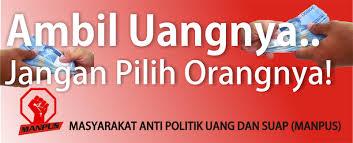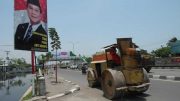Indonesian Presidential candidate Gita Wirjawan is talking up the “democratic dividend”. It’s a pun on the “demographic dividend” so beloved of the foreign analysts who write hubristic reports about Indonesia’s glorious future. This particularly laughable example from McKinsey, mostly based on interviews the then Trade Minister Mr. Wirjawan and his like, pimped the wonders of Indonesia’s demographic dividend just a few months before the economy (and the rupiah) went into a nosedive.
Mr. Wirjawan appears to hope that this year’s elections will give a boost to the economy. And they almost certainly will. Last year, I made a back-of the envelope calculation of the “democratic dividend” at the household level. Everywhere I went, I asked the price of a vote in the seemingly endless loop of elections Indonesians can now participate in. Indonesians are enthusiastic democrats — turnout at the last three presidential elections averaged 82% — and they have plenty of chances to go to the polls. In any given five year cycle, these include, at a minimum, votes for:
President (usually two rounds)
National parliament (DPR)
National regional representatives (DPD)
Provincial Governor
Provincial Parliament
District Head (Bupati or Mayor)
District Parliament
Village Head
Each of these votes can be sold, generally to a number of candidates. The prices vary widely across the country, and appear to be falling as some candidates realise it is more efficient to pay off the electoral commission rather than try and bribe the great multitude of voters. Still, with the exception of one of two local compacts for money-free votes at the village level, I never heard a price lower than 30,000 rupiah (for a provincial parliamentary vote in Java). In some races, such as those for bupati in cash-rich Papua, voters can rake in up to 300,000 from each paying candidate.
Let’s leave out the village elections and any two-round elections, and assume a conservative average of 80,000 per candidate. And let’s assume that people sell their vote to at least three candidates per election. That’s 1,680,000 rupiah per person in any given election cycle, around US$ 145. Not a vast amount, perhaps, but some 187 million Indonesians will be eligible to vote this year (67 million of them for the first time).
So that’s potentially 27 BILLION US dollar’s worth over the next five years, just on vote-buying. Then there’s the T-shirts (what did people in rural Indonesia wear before this wave of democracy, I find myself trying to remember?), the buffalo feasts, the generous donations to mosques and churches; all this just in swag for voters. There’s lots of other spending too: posters and banners and paint-jobs for cars and buildings; column inches in newspapers, and operational expenses for the “TimSes” (the Success Team), payment for paens of praise by the local poet laureate, and very much else, as Ben Bland notes in this nice FT story.
In a much more rigorous analysis than mine, Michael Buehler looked at the Indonesian money supply in years of national elections (2004 and 2009) and compared notes in circulation and bank outflows in the three months before election date with the same measures in non-election years. He found that withdrawals from banks increased three-fold in the three months before the 2009 election, while there was a measurable spike in 100,000 rupiah notes in circulation. In 2004, it was 50,000 rupiah notes that saw the big spike, suggesting that whatever can be bought with a single crisp bill became more expensive between the two elections.
Where is all this money coming from? Well, a lot comes from the personal coffers of the richer candidates, people like Golkar chair Aburizal Bakrie. Redistributing their savings into the pockets of farmers and small-scale entrepreneurs who might put their “democratic dividend” to productive use may be no bad thing. But less well-off candidates borrow against the future: the hope is that they win, and then control access to jobs, projects, political favours and cash which can be used to pay back their donors. But only one candidate can win. The rest are often saddled with huge debts. I met one former candidate in central Java who had failed to get elected to the district parliament for the PDIP party, but who was bankrupted in the attempt. “Our party rules don’t even allow vote-buying,” he said. “But when all the other candidates are doing it, what else can you do?” He now works pumping gas in the local petrol station.
As a former Minister of Trade (and former head of JP Morgan bank in Indonesia), Gita Wirjawan must understand the implications of this trickle-down-corruption better than most. The “democratic dividend” comes at a price,.






Maybe Gerinda is trying to do things differently…
“How Prabowo and Gerindra Will Get Indonesia Back on Track”
http://www.huffingtonpost.com/hashim-djojohadikusumo/how-prabowo-and-gerindra-_b_5086757.html